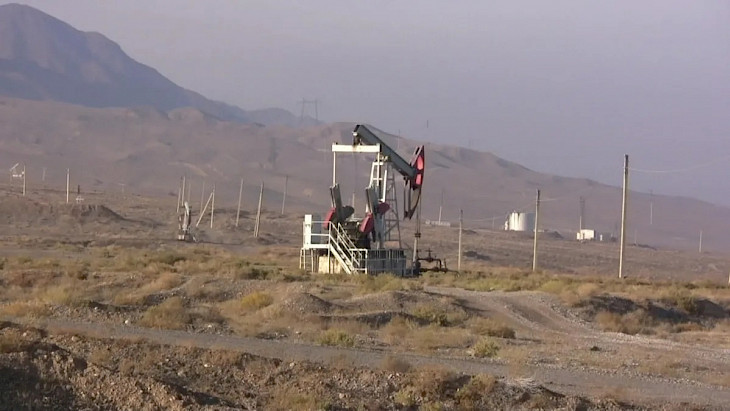The lower chamber of the Tajikistan parliament has ratified an Additional Agreement between the government of the country, CNPC Central Asia B.V., and Total E&P Tajikistan B.V., Asia Plus reports.
The new agreement is the fifth amendment to the Production Sharing Agreement concluded on June 13, 2008, between the government of Tajikistan and Kulob Petroleum Limited. Under this name, the company, which was a subsidiary of the Canadian oil and gas corporation Tethys Petroleum Limited, operated in the country.
It concerns the Bohktar Production Sharing Contract for deposits and prospective areas in southern Tajikistan.
The additional agreement, adopted by the lower chamber last week, involves the transfer of Total's stake to the Chinese corporation CNPC.
"The government agrees to such transfer and appointment in accordance with the terms of this Additional Agreement," the document states.
It is noted that the Production Sharing Agreement concluded in 2008 with Kulob Petroleum Limited should "subsequently be read and construed as an Agreement on the division of production concluded between the Government of Tajikistan and Chinese CNPC."
"The term of this Agreement begins on June 25, 2008, exclusive oil contractor operations on the contract territory may begin and will continue for a total of 47 consecutive contract years," the additional agreement emphasizes.
Brief history of the issue:
The initial agreement was concluded by the government of Tajikistan with the Canadian company Tethys Petroleum on June 13, 2008.
In late 2011, Tethys reported the discovery of "super-giant" oil and gas reserves at the Bishchinchak field. The company's specialists estimated these resources at 27.5 billion barrels of oil equivalent, with 69% being gas and 31% oil and gas condensate.
After this, the country's leadership announced that Tajikistan would be able to self-sustain itself with natural gas in the coming years.
Interest in Tajik hydrocarbon reserves began to be shown by major global companies such as Total (France) and CNPC (China).
In July 2013, Tethys, Total, and CNPC signed a participation agreement. As a result, each party acquired one-third of the stake in the Bohktar Production Sharing Agreement.
According to the agreement, the government of Tajikistan does not participate in the development and production and does not invest in this work.
However, in the event of discoveries and oil and gas production, it can take 30% of the production in kind or in value.
In September 2015, CNPC and Total demanded that Tethys Petroleum withdraw from this project. An ultimatum was issued to Tethys due to the company's failure to fulfill its obligations and debt on the project.
The matter went to litigation, and in 2017, the International Arbitration Court recognized Total and CNPC's claims as justified.
In its latest statement in early 2018, Tethys announced that it had decided to withdraw from the project due to high risk and significant expenses required to continue work.
Thus, after Total's exit from the agreement, CNPC remains its only participant.
According to data from the Geological Survey of Tajikistan, the country is experiencing a severe deficit in explored oil and gas reserves, although it has significant forecasted resources: 120 million tons of oil and 880 billion cubic meters of gas.
"Therefore, its economy is currently almost entirely dependent on the import of oil and gas industry products," emphasized the Service.
It is worth noting that extensive geological exploration work for hydrocarbons was also carried out by the Russian company Gazprom - in the south and then in the west of the country.
As a result of drilling in the Sarikamysh area of the Shahrinavsky district, geologists from Gazprom concluded that "scientists' forecasts regarding the oil and gas prospects of deep-lying subnadge deposits are confirmed."
The estimated reserves of gas, assessed with a 50% probability, amounted to 17.5 billion cubic meters, oil - 1.574 million tons, and gas dissolved in oil - 72 million cubic meters.
However, despite these findings, the company decided to surrender the license for subsoil use due to the "low economic efficiency" of these resources "in the current macroeconomic conditions."
According to the Main Department of Geology, currently, only two companies have licenses for geological exploration for hydrocarbons in Tajikistan: CNPC and the local company Somon-Oil, which operates in the north of the country.
In Tajikistan, there are 24 oil fields and 14 gas fields registered.
Crude oil and natural gas production in 2023, according to statistical data, amounted to only 0.6% of the total output of the extractive industry in the country. Last year, slightly over 18 thousand tons of oil were extracted, which is 27.4% less than in 2022.
There is no data on natural gas production.
Former Director-General of Tajikneft (1981-1988) Nabi Malikov previously told Asia Plus that in the 1980s, alongside Uzbekistan, Tajikistan discovered new deposits. During the period from 1981 to 1985, Tajikneft discovered 3 new fields and 4 oil and gas deposits, while Uzbekneft discovered 4 fields and 3 deposits.
After the collapse of the USSR, in 25 years of independence, Uzbekneft discovered more than 150 new fields, while no new fields were discovered in Tajikistan.
CentralasianLIGHT.org
March 29, 2024

